An Effective Guest Blogging Guide (+ 13 Writing Tips)

Hand off the toughest tasks in SEO, PPC, and content without compromising quality
Explore ServicesGuest blogging is one of the most effective ways to build backlinks.
There, I said it.
Here’s the catch though:
If you are inexperienced with the process, it can seem daunting.
Even if you are experienced, it can be hard work. Especially if you’ve been on the receiving end of one too many awful outreach emails.
But actually the whole process is a pretty simple.
That’s why we wrote this (simple but effective) guest post guide. In this guide you’ll learn the basics of outreaching for links, how to find guest post opps and how not waste your time or resources.
A Simple (but Effective) Guest Blogging Guide
There are only a few steps you need to take, it’s just a matter of committing the time to seeing it through. What you need is a guest post guide that explains all the basic principles of a successful campaign.
If you don’t know all the right strategies you will find that you don’t have much success. You don’t get that many guest posts published, and even when you do it doesn’t help your rankings. Instead of giving up, you just need to know the basic principles of effective guest blogging.
Before we get into writing tips for running a successful guest posting strategy, let’s take quick look at some of the basis you need to know:

What is Guest Blogging?
Looking for high-quality links AND content? Learn what guest blogging is and how it can help improve your SEO + grow your business.
What is Guest Blogging?
Guest Blogging Benefits
Learn about the benefits of guest blogging, like: building your brand, landing POWERFUL links, increased traffic & more.
Guest Blogging Benefits
Guest Blogging Guidelines
Submitting guest posts to other sites or accepting them on your own? Follow these simple guidelines for the best guest blogging results.
Guest Blogging Guidelines
Guest Post Opportunities
Looking for MORE guest blogging opportunities? Check out these methods for quickly finding high quality targets right now.
Find Link Opportunities
Done-for-you Guest Posts
Need some help getting niche relevant links on relevant sites (with actual traffic)? Try our guest post service to gets links on REAL sites.
Get Guest PostsUncover new backlinks 🔗
Give us some competitor URLs and we’ll analyze the backlink profiles of each to look for overlaps. Then we’ll pull it together into an actionable backlink gap analysis report.
13 Actionable Tips For Writing Guest Posts
With that foundation laid, it’s time to get into actionable tips you can use to write guest posts.
But remember, you don’t just want to get as many guest post links as you can. You want to get as many good guest posts from high quality and highly relevant blogs.
How to write guest posts
Here are 13 actionable tips for writing great guest posts (people actually want to read):
- Include links to your own website
- Direct people to a specific goal (or landing page)
- Mention industry/niche experts
- Write for relevant authority sites
- Encourage the site to promote your guest posts
- Write evergreen articles
- Carefully consider your anchor text
- Answer user comments
- Aim your content (mostly) at beginners
- Show off your unique voice
- Write a strong introduction
- Track your results
- Keep writing + scale your guest posting
Let’s explore them in more detail:
1. Include links to your own website
It sounds obvious but it’s the fundamental point of a guest post.

Getting a link back to your website is the whole point of guest posts.
So when you’re pitching or writing a guest post, always make sure you are allowed to include a link. If you cannot, it’s not worth your time.
This is the simplest rule for guest posting, but it’s so important it bears mentioning. Don’t forget to get that link!
2. Direct people to a specific goal (or landing page)
Keeping your ultimate goal in mind, make sure your guest post directs people in a way that best achieves it.
For example, if you want to increase your domain authority you should set your link to your home page. But if you want to improve your SEO for a given keyword, you should link to a specific page on your site that focuses on that keyword.
Here are a few other examples of where to direct people to meet your goals:
- Email sign up page to get more subscribers
- Page for niche-specific giveaway to increase subscribers
- Landing page for a product, service, or eBook
No matter what you choose, you should make sure you are deliberate with where your guest posts direct people. That’s how you have the best chances of meeting your end goal.
3. Mention industry/niche experts
Want to have more success with a guest post you write?
Start name dropping the big names in your niche.
These are the experts in your industry, the most widely read authors on your subject online. This may seem like a weird tactic, but there are three good reasons for doing so:
- You get positive association with the expert you namedrop
- You can tag the expert on social media so they like or share it for their own exposure
- You may be able to use it as an opportunity to grow a relationship with them
The third point is the best outcome possible. Being able to form a relationship with the big experts in your niche opens a lot of doors to you for future guest posting. It also helps your professional networking in general.
4. Write for relevant authority sites
Backlinks are still one of the most important rank factors for SEO.
But for the past few years Google has shifted how they’re important to focus on relevance and authority. If you get a link from a guest post that isn’t relevant to your website, you won’t get any SEO benefit from it.
Here’s an example: we at Loganix are an SEO and online marketing agency. Now imagine we write a guest post on a home cooking blog about our favourite chicken stew recipe. Would you take any value from that as far as convincing you we’re experts at SEO? No, and neither would Google.
The other element of importance is the authority part. You don’t want a link from just any website even if they are relevant. You need links from high authority websites. That’s the only way you will get a significant boost to your SEO.
This is because back in August 2018, Google introduced a new algorithm update that put a huge amount of focus on the idea of E.A.T. — Expertise, Authority, and Trustworthiness.

Source: https://moz.com/blog/google-e-a-t
The idea is that Google wants to show people the most relevant and most correct information in their search results.
In order to establish yourself as an authority, you need to make sure you get links from other websites that Google already trusts as experts.
5. Encourage the site to promote your guest posts
In order to get the most value from your guest posts, you need more promotion. The more views a post gets, the more likely they are directed to your end goal. It will also make the blog owner happier, and more likely to accept future guest posts from you.
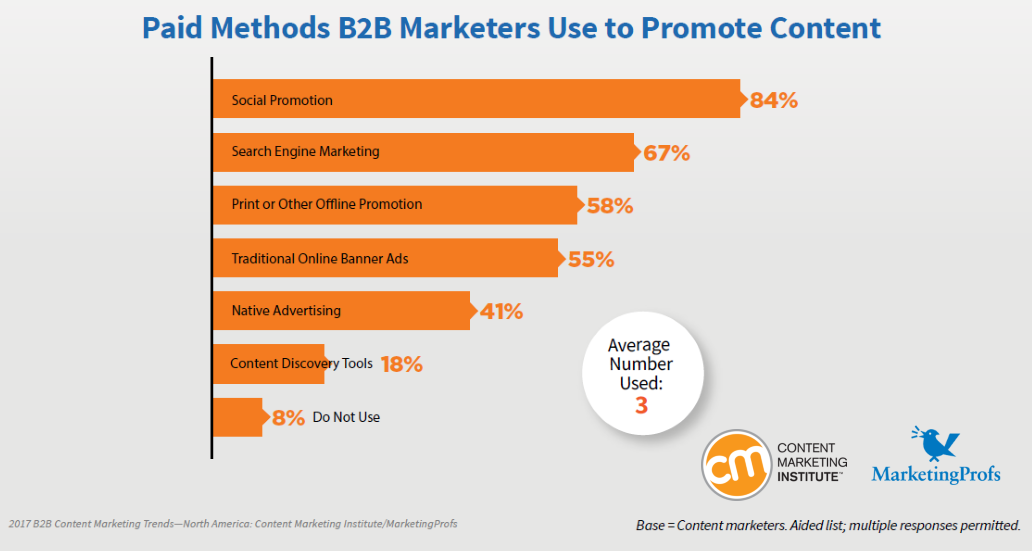
One way to get better promotion is to politely ask a website that publishes one to promote your other guest posts. They can add links to other guest posts in their emails to their own subscribers, or share them on social media.
There’s no guarantee that they will, but if you nurtured a good relationship with them you would be surprised how many will do it. You can increase your success by offering to return the favour and share their posts to your followers. It’s a small thing to ensure greater mutual benefit from each other.
6. Write evergreen articles
When writing guest posts, you want to get the most possible benefit from them.
That means you should avoid writing posts on very time-sensitive topics. The issue is that such topics will quickly fall out of public interest, and no one will search for such things past a month or a year.
Instead, focus on “evergreen” content:

Source: https://blog.alexa.com/make-evergreen-content-boosts-seo-success/
Evergreen refers to content that is always relevant, and always of interest to people. That way you may continually have people finding your guest post through organic searches, giving you a potential steady stream of people finding you and your site.
An example of time-sensitive topics includes any current events, or year-based lists. One example is “10 best air conditioners of 2020” — as soon as the year becomes 2022 it’s already irrelevant. An example of evergreen content is “10 signs your air conditioner needs maintenance”.
Want to know how to find good evergreen ideas?
You can greatly increase the ROI of your guest posts with some good old fashioned keyword research. Find keywords that always have strong monthly search volumes. See what posts rank for those keywords, and ask yourself:
- Does it rank well on Google for a keyword phrase that is going to continually benefit my own site and goals?
- Does it boost my reputation and credibility in the niche?
- Did it make me any new contacts in the industry?
- Did it create a discussion on the post or somewhere else?
If you answer yes to these questions, it’s a good guest post topic for you to write about.
7. Carefully consider your anchor text
Anchor text is the clickable text of a hyperlink. It is also an important ranking factor for search engines like Google.

The link itself is important for connecting to the domain and its associated metrics. That is, the expertise, authority, and trust that Google cares so much about now.
Anchor text is part of what they use to assess a link’s relevance. When you write a guest post and get a link back to your website, it’s important to carefully choose the anchor text you use for it. Ideally it should use the important keywords you want to rank for.
Let’s use an example. If you’re a business that sells accounting software and are writing a guest post, you’ll want the anchor text to be something like:
- Free accounting software
- Accounting software tools
- Accounting software for businesses
- Best accounting software for small businesses
When you are picking the best destination to link to in step #2 above, try and make your anchor text one of the main keywords you want that page to rank for. Be sure to mix it up and avoid using the exact same anchor text for all your posts, or it will look unnatural to Google.
8. Answer user comments
For websites that allow users to comment on their blog articles, it is very important to reply to any questions or comments.
Why?
Because it is a good way to directly engage with them, and to further establish a sense of expertise and authority.
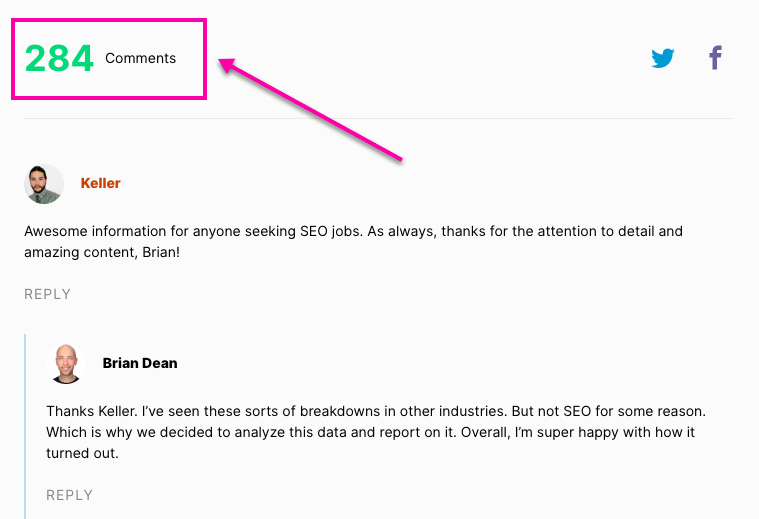
Those people are more likely to follow you on social media, or to click on the link to your website. It’s a great way of building your brand among people who have active interest in what you wrote.
If you have a lot of people asking the question, you can collect them into a new guest post as a Q&A or FAQ. That can generate more discussion in the comments, and to solidify your expertise to the commenters even further.
9. Aim your content (mostly) at beginners
It’s important to keep in mind that most people who read your guest post will be new to your content. When you write a guest post, write it for people who are brand new and inexperienced to the type of information you can provide them with.
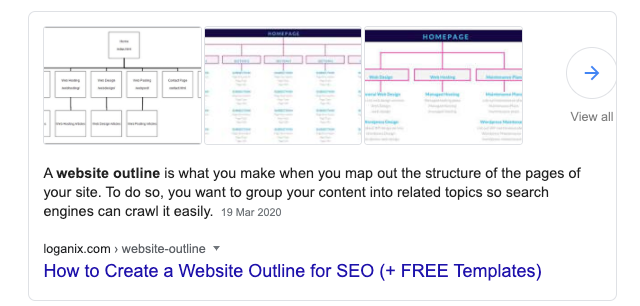
Pick something that is related to the blog you are writing for, but on a topic not covered there before. People who have already read similar articles likely aren’t searching articles like that, so you don’t need to try chasing their interest.
Instead, write the article to give them new information they don’t know the answer to. Give them helpful and useful information on a question or topic they’re looking for. This is where your keyword research will also come in handy.
There are a few types of articles that are particularly helpful to beginners:
- List posts
- How-to guides
- Frequently asked questions
- Rankings and/or reviews for types of products or services
Make sure you load these articles with useful resources and links to give more information. Use an instructional tone with easy to understand language. Avoid using complicated jargon or overly technical terms that beginners won’t understand.
10. Show off your unique voice
One of the main benefits of guest posts is establishing your brand to a new audience. One of the key ways to create a memorable brand is to have a unique voice or view that people can easily identify.
Aside from focusing on writing a guest post that’s high in quality and informative to beginners, you want to be memorable. You want to win them over, so they remember who you are long after they read your post.
Figure out what voice you have that is genuinely you, but also unique (in a positive way) in your niche. Don’t try and fake something you’re not. If you’re a funny or witty person, run with that. If you’re no-nonsense and to the point, don’t stray from it.
Make it consistent across everything you write, so when someone reads a new post by you they will easily recognize and trust that it’s you. It’s a great way to help earn more regular readers and followers.
11. Write a strong introduction
We all know how important first impressions are, and it’s true for guest posts too. That means you really need to hit a home run with your headline and the opening section of the article. You want people to be intrigued by what they first see, because they’re likely just scanning through casually rather than reading in detail.
Think of it like an inverted pyramid:
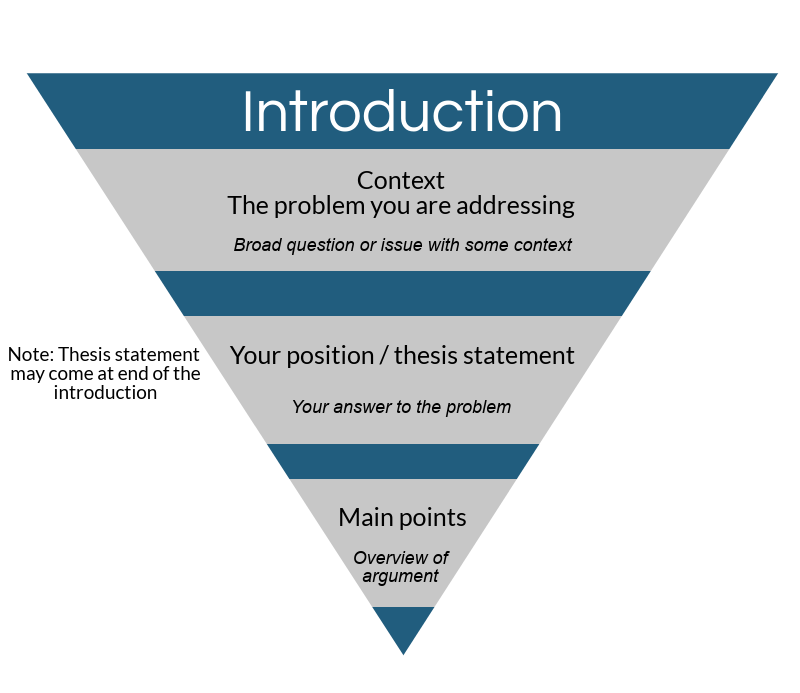
You want to use a strong hook that addresses the pain point they have. What don’t they know? What problem are they trying to solve? Entice them to read on, because you have the answer they’re looking for.
This can be difficult to achieve. According to one study, 55% of people read articles for 15 seconds or less. So if you can get someone to go from scanning to really reading, you’ve won! That’s how you get longer average session duration times in Google Analytics for your articles.
Getting a click is only the first step. It might be difficult, but it’s equally important to keep them dwelling on the page for as long as you can. The fact that it’s difficult makes it a bigger achievement if you do hold onto their attention.
12. Track your results
If you are trying to see how well your guest post campaign is meeting your goals, you need to make sure you can track the results of each post.
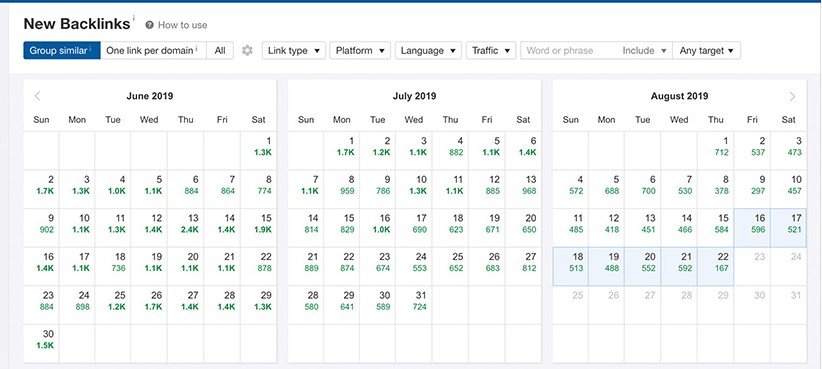
It’s also important so you can adjust your budgeting for guest posts according to the ROI. That means being able to find accurate data on things like:
- How your domain ratings increase since the start of your campaign
- How your keyword rankings increase
- How much referral traffic you get to your website from the links
- How many new subscribers or giveaway entries you generate from guest posts
If you aren’t seeing any improvement in these areas, you know that what you’re doing isn’t working. You can change things up and try again until you find what works. On the other hand, if you see lots of improvement then you know what to keep doing.
To track your domain rating or keyword rankings, you can use SEO tools like Ahrefs, Moz, SEMRush or countless other rank tracking tools.

They have tools and features for that specific purpose. You can check them once per day, week, or month, and enter the data into a spreadsheet to track performance over time.
For things like website traffic or new subscribers, you can track that in Google Analytics with UTM parameters added to the link in your post. UTM parameters are extra bits added to a URL that helps you track traffic from specific links in your Analytics account.
One caution is that adding UTM parameters to a link can make them longer and look less natural. Always check with the website owner that they’re okay with you using it. It can be masked by a URL shortener like bit.ly, Rebrandly or another similar tool, but some sites won’t allow them.
13. Keep writing + scale your guest posting
The golden rule for any guest posting campaign is to always keep writing. You can’t get a few links, call it a success, and end the campaign then and there. You should get into the habit of writing for as many different websites as you can, as long as they’re still good quality and relevant.
Like most things in SEO, it’s all about consistency.

Source: https://joerinaldi.blog/2018/03/07/consistency-over-intensity/
That’s how you get the most possible benefit out of guest posts. The most clicks, traffic, domain rating and keyword ranking improvements. More links, from more domains, earned over a longer period of time sends a much stronger signal to Google that you’re an authority.
On the other hand, don’t over do it. You don’t have to churn out a new post every day. Find what works for your schedule without adding too much work and stress. If that’s once a week, great! If you can only do it once a month, that’s fine too. Just make sure you stick to your schedule on a regular basis.
Summary
All of these tips are the basics for what you need to know to write a good guest post. It covers everything you need for each step of the process: preparation, research, writing, and tracking. Use these tips and strategies to improve your guest blogging campaign and learn how to adjust over time.
The more experience you gain, the better at it you’ll become. There are some subtle things you will pick up on to make a campaign work better for you, your brand, and how you write. These tips are meant as a general framework, within which you can add your own personal style and touches. Just keep at it and you will eventually have great success!
Hand off the toughest tasks in SEO, PPC, and content without compromising quality
Explore Services




